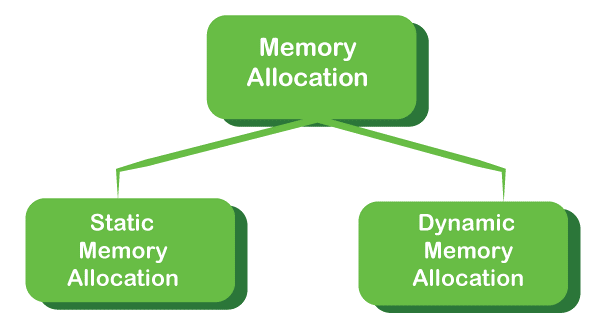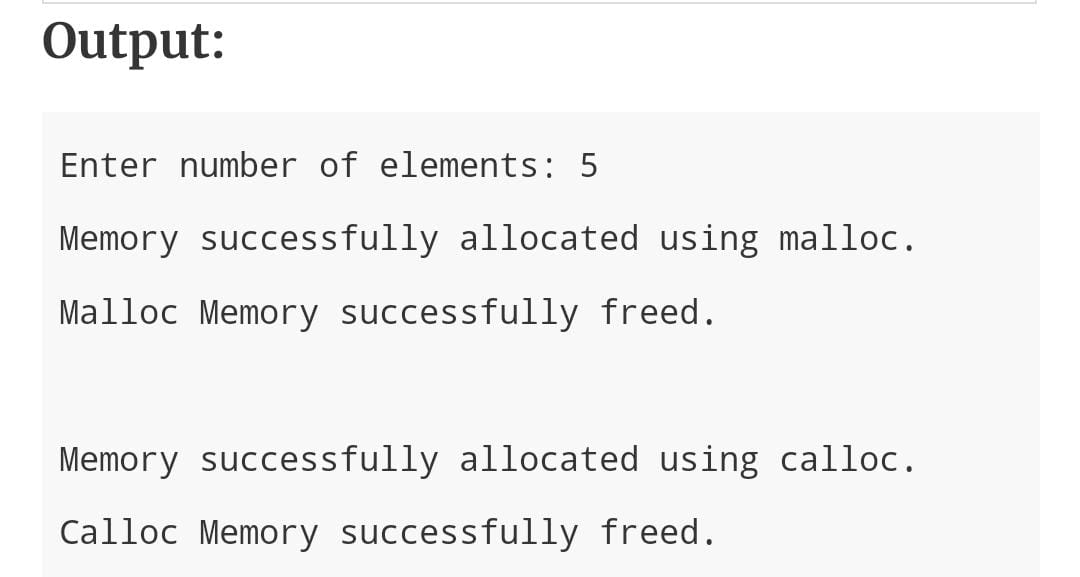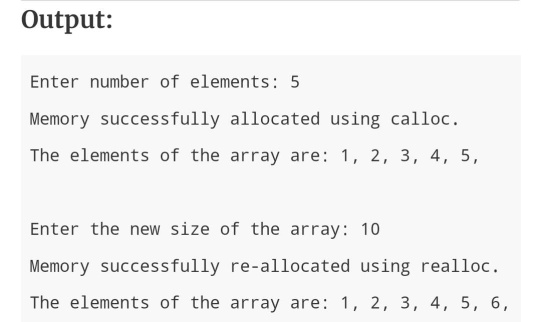Static and Dynamic Memory allocation
Static and dynamic memory allocations are the two main ways of allocating memory and managing the storage space of variables. When one allocates more storage space for variables, then there is an increase in the scope or length of stay in memory. Both of these allocation strategies have their own advantages and disadvantages. This article explains what they are and when to use each type of allocation strategy.

Static Memory Allocation
Static memory allocation means that some space in memory is reserved, and forgotten about it. When we want to access that reserved space again, one has to reserve it again. This is the only memory allocation strategy that does not have to manage a block of memory that gets released at some point. If one has allocated a static block of memory, one can forget about it and won't have to release the memory again. This proves to be useful when needing to reserve a large amount of storage space. For example, allocating a static buffer that can be used to save a potentially large amount of data.
Pros of static memory allocation
- No need to release the allocated storage space.
- It’s reserved for a specific amount of time and it’s always accessible.
- Can be used for large data storage. For example, in a database program, to allocate a static buffer, use it to save large amounts of data.
- It's very reliable.
- No garbage collection is needed because the amount of memory used is fixed.
- It runs faster than dynamic memory, since no garbage collection is required.
- Code is easier to understand.
Cons of static memory allocation
- One need to access the memory allocation.
- If we don’t have direct access to the memory allocation, we can forget about it and it will be unavailable for future programs.
- As soon as we access the data, we have to release it.
- Once access the data, we have to release the memory space for other programs to use.
- More complicated to use.
- One has to explicitly reserve and release the allocated space.
- Requires a high amount of computational overhead.
- This overhead is needed to reserve and deallocate the space.
- One must determine the size of the array ahead of time, so this can limit the programming options if one is not sure how much memory will be needed.
- If we need more than what we do is to allocate in the beginning, we have to reallocate again, each time resetting all the pointers that reference that block of memory.
Dynamic Memory Allocation
Like static memory allocation, dynamic memory allocation doesn't allocate any new memory and one can forget about it. However, when dynamic memory allocation is used, we have to manage blocks of memory that have to be released when they aren't being used anymore. The memory blocks have a limited scope in memory, so when one has been finished using them, then release them again and make room for new data. This means that when a dynamic memory allocation strategy is used, then we can forget about the storage space in the variables, but remember to deallocate them if we do not need them anymore. This is an important difference between static and dynamic memory allocation.
Pros of dynamic memory allocation
- Good Speed.
- Dynamic memory allocation is less likely to run out of memory than static memory allocation. This means the program can allocate more memory when needed to accommodate changes.
- If we use dynamic memory allocation, we can use the same memory address for variable assignments. This means that program runs faster because there is less code for the computer to read.
- Dynamic memory allocation is scalable. This means the program can use more memory as needed without it negatively affecting other programs sharing the resources.
- Dynamic memory is more flexible.
- We don't have to specify how much space to reserve in advance, so it's easier to write programs with a lot of unknowns when it comes to data size needs.
- Since we can allocate only what we need when we need it, we don't run into issues with trying to resize an array like in static memory.
Cons of Dynamic Memory Allocation
Apart from all above pros, there are a couple similar drawbacks of Dynamic memory allocation:
- It requires additional overhead for runtime management (such as garbage collection). This means increasing time complexity and decreasing performance.
- Code may be more difficult to read due to additional malloc and free calls.
- Memory Loaders in Static and Dynamic Systems.
Types of Dynamic Memory Allocation
Dynamic memory allocations are of four different types and they are:
1.malloc():
Malloc () also referred to as a memory allocation, is a method which is used in c to dynamically allocates large single blocks of memory with a given size. It does not initialize during the time of execution.
The program for this memory allocation is given below:
#include <stdio.h>
#include <stdlib.h>
int main()
{
int* ptr;
int n, i;
printf("Enter number of elements:");
scanf("%d",&n);
printf("Entered number of elements: %d\n", n);
ptr = (int*)malloc(n * sizeof(int));
if (ptr == NULL) {
printf("Memory not allocated.\n");
exit(0);
}
else{
printf("Memory successfully allocated using malloc");
for (i = 0; i < n; ++i) {
ptr[i] = i + 1;
}
printf("The elements of the array are: ");
for (i = 0; i < n; ++i) {
printf("%d, ", ptr[i]);
}
}
return 0;
}Output:

2. calloc():
Calloc () or contiguous memory allocation are the type of dynamic memory which helps in allocation of block of memory of the same or specified type. It is similar to malloc, but the only difference is that it can initialize at a default value of ‘0’. The program is given below:
#include <stdio.h>
#include <stdlib.h>
int main()
{
int* ptr;
int n, i;
n = 5;
printf("Enter number of elements: %d\n", n);
ptr = (int*)calloc(n, sizeof(int));
if (ptr == NULL) {
printf("Memory not allocated.\n");
exit(0);
}
else {
printf("Memory successfully allocated using calloc.\n");
for (i = 0; i < n; ++i) {
ptr[i] = i + 1;
}
printf("The elements of the array are: ");
for (i = 0; i < n; ++i) {
printf("%d, ", ptr[i]);
}
}
return 0;
}
3. free()
Free() method also referred to as de-allocated memory. It helps in de-allocation malloc() and calloc(). This method helps in reducing the wastage of memory.
Its code is given below;
#include <stdio.h>
#include <stdlib.h>
int main()
{
int *ptr, *ptr1;
int n, i;
n = 5;
printf("Enter number of elements: %d\n", n);
ptr = (int*)malloc(n * sizeof(int));
ptr1 = (int*)calloc(n, sizeof(int));
if (ptr == NULL || ptr1 == NULL) {
printf("Memory not allocated.\n");
exit(0);
}
else {
printf("Memory successfully allocated using malloc.\n");
free(ptr);
printf("Malloc Memory successfully freed.\n");
printf("\nMemory successfully allocated using calloc.\n");
free(ptr1);
printf("Calloc Memory successfully freed.\n");
}
return 0;
}
4. realloc()
Realloc memory is a type of memory method which helps to find the previous memory allocation, and this is done or this process takes place if there is insufficient memory in calloc or malloc, so dynamically realloc method is being used where a new block is added with the help of a default garbage value.
The code is given below:
#include <stdio.h>
#include <stdlib.h>
int main()
{
int* ptr;
int n, i;
n = 5;
printf("Enter number of elements: %d\n", n);
ptr = (int*)calloc(n, sizeof(int));
if (ptr == NULL) {
printf("Memory not allocated.\n");
exit(0);
}
else {
printf("Memory successfully allocated using calloc.\n");
for (i = 0; i < n; ++i) {
ptr[i] = i + 1;
}
printf("The elements of the array are: ");
for (i = 0; i < n; ++i) {
printf("%d, ", ptr[i]);
}
n = 10;
printf("\n\nEnter the new size of the array: %d\n", n);
ptr = realloc(ptr, n * sizeof(int))
printf("Memory successfully re-allocated using realloc.\n");
for (i = 5; i < n; ++i) {
ptr[i] = i + 1;
}
printf("The elements of the array are: ");
for (i = 0; i < n; ++i) {
printf("%d, ", ptr[i]);
}
free(ptr);
}
return 0;
}Output

Difference between Static and Dynamic Memory Allocation
There are one major differences between static and dynamic memory allocation strategies:
- Static memory allocation doesn't release the allocated blocks of memory. They are just reserved, so we cannot forget about it. However, if we need to access them again, then reserve them again. And if not, then forget about them and they can't be used by other programs.
- Dynamic memory allocation releases blocks of memory when they are no longer needed. However, it doesn't reserve the blocks again in advance. So when the program is finished accessing them, the memory is released again and new data can be stored there.
So, why is static memory better for programs that don't require changing often, and dynamic memory better for more frequently-updated programs? The answer lies in the way memory loaders work between the two systems. Let us see below:
Static Memory Loader
The static memory loader places pages of information in a program's address space during compilation—so all the memory that a program needs is allocated before it even begins running. It's efficient because it requires less loading time and can store more information.
Dynamic Memory Loader
Dynamic memory loaders are a bit different. They don't allocate any space until runtime, which means you can add pages of information while your program is already running. This comes in handy when your program needs to dynamically request additional information, like a long search query or a large document upload.
Difference table between Static and Dynamic Memory Allocation
| Static Memory Allocation | Dynamic Memory Allocation |
| Static memory allocation is used in array. | whereas dynamic memory allocation is used in linked-list representation. |
| This allocation strategy is simple performing allocation. | dynamic memory allocation strategy is complicated. |
| It reduces time complexity | It is slower than static and time consuming |
| It allocates memory from the stack. | It allocates memory from the heap. |
| It is allocated during the compile time. | It is allocated during the run time. |
| it is less efficient when compared to dynamic memory. | It is more efficient than static memory. |
Adaptive Memory: Hybrid Solutions for Maximum Efficiency
When it comes to memory, there is one more type you should know about; adaptive memory. This hybrid approach that combines static and dynamic memory, offering the best of both worlds—maximum performance and flexibility at the same time.
So, what makes adaptive memory so special? Here are a few key benefits:
- Flexible Storage: Adaptive memory allows you to expand and contract storage depending on the needs of your application, offering the flexibility to add or remove resources quickly without disruption.
- High Capacity: Adaptive memory offers higher capacity than static memory, allowing for larger datasets and more efficient processing.
- Fast Performance: Thanks to dynamic features like caching and prefetching, adaptive memory can offer faster response times than either static or dynamic memory alone—making it an ideal choice for mission-critical applications.
In addition to its many advantages, adaptive memory also offers greater reliability than traditional static or dynamic solutions—which means fewer disruptions, less downtime and improved security overall. All in all, if one wants maximum efficiency out of the application’s memory capacity, adaptive memory is definitely worth looking into.
Conclusion
Memory is an essential element for any computer system. Knowing the differences between static and dynamic memory can help us choose the right solution for our computing needs. Static memory allows for faster access time and higher stability, while dynamic memory offers more flexibility and lower power consumption. However, both types of RAM have their own advantages and disadvantages, so it’s important to weigh up the pros and cons before deciding which is the best solution for you. Ultimately, the choice of memory type will depend on the type of application
Final Words
Memory allocation is the process of allocating memory to variables in your programs. The type of allocation strategy you choose will heavily impact the usability and flexibility of your code, so it is important to know the differences between static and dynamic memory allocation.